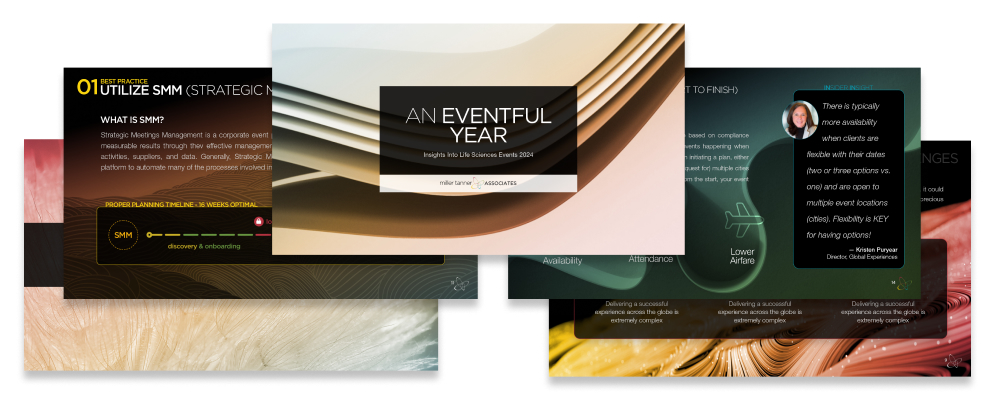Planning an event involves a lot of moving parts, and one of the most pivotal aspects to consider is the budget. Effective event budgeting is necessary to ensure that your event is a success without breaking the bank. Discover the process of event budgeting, along with tips and best practices to help you stay on track. If you need help planning your event, don’t hesitate to reach out to Miller Tanner Associates for expert assistance.

Understanding Event Budgeting
Event budgeting is a little more complex than just adding up the costs. It involves a series of financial assessments, estimates, and checks that ensure your event doesn’t just go well but also stays financially stable and sustainable. Take a closer look at the steps involved in creating an event budget and the factors that you need to consider.
Steps to Create an Event Budget
The event budgeting process can be broadly broken down into two primary steps.
1. Identifying Expenses
You must first identify all possible expenses. This includes every cost associated with your event, from location rent, equipment hire, and catering to speaker or performer fees, decorations, and transportation. Don’t forget to include minor costs like stationery and printing, as these can add up. The idea is to leave no stone unturned so you won’t be caught off guard by unexpected expenses.
2. Estimating Revenue
After calculating the expenses, the next step is estimating the revenue. This will primarily come from ticket sales, sponsorships, and any merchandise or food and drinks you plan to sell at the event. Be realistic when estimating your revenue to avoid any unexpected shortfalls.
Factors to Consider in Event Budgeting
There are numerous factors that you need to consider when creating a budget for your event. Here are two of the most significant ones:
1. Venue Costs
The venue is typically one of the largest expenses in any event budget. The cost of the venue relies on several factors, like location, size, amenities, and the date of the event. Account for additional costs such as parking, security, and cleaning.
2. Catering and Refreshments
The food and drink you offer at your event can also significantly impact your budget. Factors such as the type of event, the number of attendees, and the time of day will all affect your catering costs. If you’re planning a full-day event, for example, you may need to provide lunch and refreshments, which will increase your catering expenses.
3. Travel Expenses for Attendees
It is crucial to create a detailed budget for travel expenses for attendees. This budget should include costs such as transportation, accommodations, and any other related expenses. By estimating these costs accurately and setting a clear budget, event organizers can ensure that attendees have a smooth and enjoyable experience without overspending. It is important to research different options to find the most cost-effective solutions while still providing quality services to all participants.
Best Practices for Event Budgeting
Event budgeting goes beyond understanding costs and revenue. Implementing the following best practices can help you optimize your budget, manage your finances more effectively, and ultimately create a more successful event.
Allocating Funds for Marketing and Promotion
Don’t underestimate the power of marketing and promotion when budgeting for your event. Setting aside funds for advertising, whether it’s through social media, local press, or radio, is helpful to attract an audience and generate revenue. Keep in mind your target audience and the marketing channels that will most effectively reach them.
Contingency Planning for Unexpected Expenses
Unexpected expenses will inevitably arise while planning your event. This is why it’s wise to set aside a contingency fund, generally 5-10% of your budget. This safeguards your event from unforeseen costs and ensures that you won’t have to scramble for additional funds at the last minute.
Tools and Resources for Event Budgeting
There are plenty of tools and resources available that can aid in the efficient planning and execution of event budgeting.
Budgeting Software and Templates
There are numerous budgeting software and templates designed to streamline your event budgeting process. These tools help you track expenses, estimate revenue, and manage your funds effectively.
Professional Financial Services
Professional financial services can be beneficial for larger or more complicated events. These services provide expert financial planning and management to ensure the success of your event and the efficiency of your budget.
Plan Your Event With the Assistance of Miller Tanner Associates
Event budgeting is more than just crunching numbers; it revolves around strategic planning, risk management, and financial forecasting. Proper event budgeting may seem daunting, but with the right tools, resources, and practices, you can create a financially sound event that will make an impact. Remember, the goal of event budgeting is not just to cut costs but to make wise decisions that maximize your event’s success and return on investment.
To learn more about our event planning services, contact us. With our wealth of experience and expertise in managing successful events, we can ensure your event is budgeted, planned, and executed to perfection.
Image Source: PeopleImages.com – Yuri A/Shutterstock

